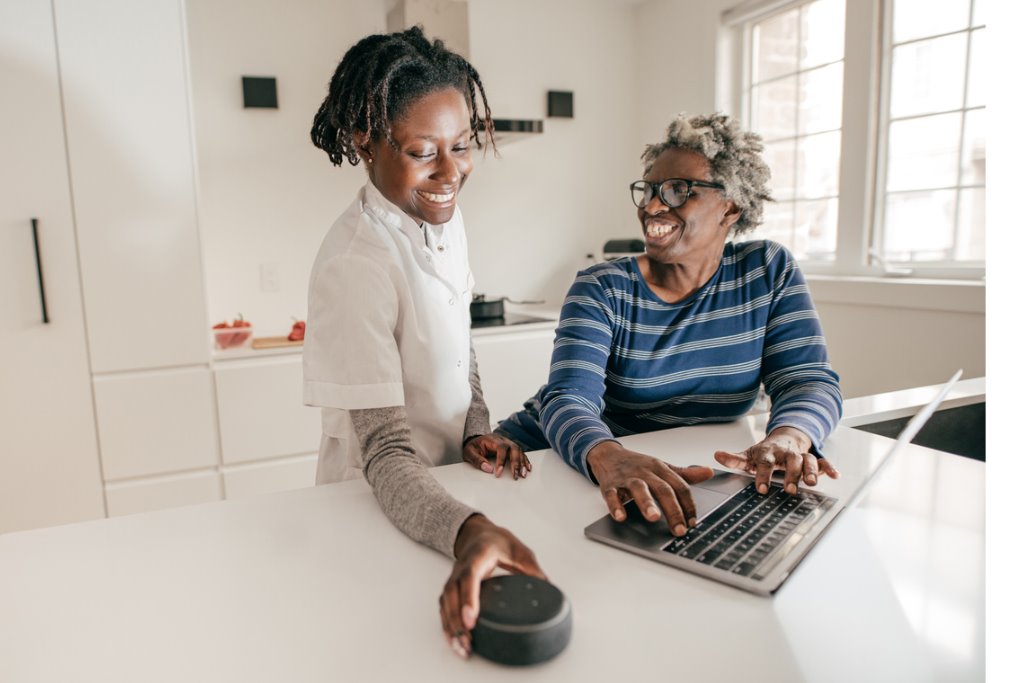
Is there really a benefit to universal connectivity?
Hearing aids with advanced connectivity features, like Phonak Audéo Paradise, have the potential to provide your clients with numerous benefits, including the technology needed to support independent living!
Are you tired of asking your patients what smartphone they have? Frustrated with how often you have to troubleshoot connectivity problems? A quick scan of audiology groups on Facebook seems to indicate you are not alone. With the explosion of connectivity in hearing aids, audiologists have had to quickly expand their knowledge from hearing and hearing loss to include a dizzying array of ever-changing and expanding technologies.
Yet, is it worth it? Does connectivity add anything meaningful to the lives of patients? Abso-freaking-lutely! In fact, universal connectivity offers several potential benefits including optimized access to the internet, greater connectedness to friends and family, and even the opportunity to bring more patients into your clinic!
Living independently just got easier
A topic of massive interest lately, especially with the impact of COVID-19 on residential care facilities, has been the concept of ‘aging in place’, where seniors have the ability to live independently in their own home. Unfortunately this can be challenging for seniors, especially if there are physical, emotional, or cognitive challenges that interfere with independent living. In today’s world of social distancing, even visits from a caregiver are not always possible.
However, there is the possibility to use technology to overcome some of these barriers, such as the use of a tablet or smartphone to optimize tasks and allow for regular check-ins with friends and family. However seniors often have varying levels of comfort using these technologies, which can make adoption difficult.
This is where features like Tap Control, found in the new Phonak Audéo Paradise, can come in handy. By connecting Audéo P90-R to a smartphone or tablet with a built-in voice assistant, they can use Tap Control to optimize writing and receiving messages, making phone calls, checking the weather, calling a taxi, setting reminders to take prescriptions, and hundreds of other possibilities.
This is a prime example of hearing aid connectivity making it easier to interface with modern technology, allowing seniors to better leverage the power of the internet to maintain their independence.
Do seniors actually like this technology? Yes!
Now I know this sounds almost too good to be true, but pilot studies of voice-assistant technologies with seniors have shown great promise in addressing their unique needs. In a study completed in a residential retirement home in California, households were given a smart speaker with a built-in voice assistant and trained on how the device could be used to optimize their daily lives. They were then allowed to use the speaker in their home as they saw fit for several weeks.
At the end of the study, a whopping 75% of participants reported using the device at least once daily and 71% reported they felt more connected to their friends, family, and the community than before they had the speaker. Finally, 100% (yes… 100% of participants) stated that the smart speaker had a positive impact on their life. The households in this study were elderly, yet they adopted the technology quite well! How is this possible? We don’t normally consider this group to be that tech-savvy, yet they quickly adapted to and benefitted from this technology.
As audiologists, let’s take ownership!
For me, the success of this study didn’t just lie in the technology itself, but rather the inclusion of educational workshops, where participants learned how to use the technology to optimize their daily lives.
With this in mind, could we as audiologists lead the charge on educating patients on how technology can better their lives? Could these topics be addressed in open houses and friends and family events in the clinic to attract new patients to the practice?
As I know you are aware, universal connectivity can be a great talking point to use with just about any age group when discussing the need for amplification. However far too few people use it as a way to get people in the door! What are some ways you can leverage universal connectivity to get your community interested in hearing aids?
So the next time you find yourself frazzled over another smartphone, or hurriedly re-installing an app… just remember: this is all part of the process of changing someone’s life for the better. Everything that you do in the clinic has an impact. Twenty years ago, we only dreamed of the things that hearing aids can do today. Enjoy it, even in the moments when you wish you could tear your hair out… universal connectivity offers incredible benefits not just to your patients, but also your practice. Finally, just remember it could always be worse, you could be adjusting trimpots!
For a great guide for getting to know Siri as a senior, as well as a compendium useful commands, visit: Senior Tech Club.
